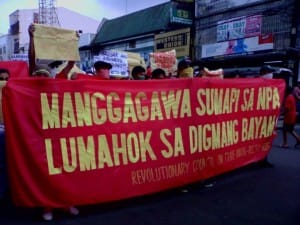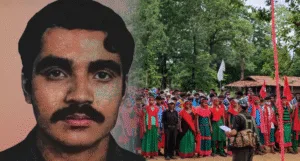My wife Julie de Lima, our children and grandchildren and I convey our most heartfelt condolences to the beloved widow Manang Zeny, the children and grandchildren of Rep. Jose V. Yap on his passing away.
My family share a deep sense of loss and grief with his family. At the same time, we are all consoled by the fact that the man whom I fondly call Mang Apeng made outstanding achievements and rendered excellent service to his people as mayor, as legislator, as cabinet member, as national executive and as provincial governor.
Most importantly, he served the people as a fighter for national independence, democracy, social justice, development and peace whether he was in or out of the imperialist-controlled reactionary government of big compradors and landlords. He was both a dear personal friend and a political ally with a high sense of patriotism and social conscience.
I first came to know Mang Apeng personally within the second half of the 1960s. I was introduced to him by my revolutionary comrades who were his relatives and friends in his hometown of Victoria, Tarlac, which had been a bulwark of the old revolutionary movement up to the 1950s. We enjoyed talking about national and international issues and prospects in Ilocano.
Mang Apeng was supportive of the expansion of Kabataang Makabayan in Central Luzon. In turn, the KM gave the strongest possible support to him and other patriotic members of Congress in opposing the anti-national and anti-democratic policies of the Marcos regime. He was a member of the Magnificent Seven that stood fast against the US military bases and the US war of aggression in Vietnam.
The KM activists of Central Luzon had their own connections with the revolutionary mass movement in the countryside of Central Luzon. But Mang Apeng was also helpful in facilitating communications between the proletarian revolutionaries based in Manila and the good remnants of the people's army who were based in the second district of Tarlac.
Together with Benigno Aquino, he and I shared the foresight that the Marcos regime was scheming to impose a fascist dictatorship on the Philippines. We held the common view that it was necessary for the people to wage resistance. The years of 1968 to 1972 were intense years of legal political struggle between the Marcos regime and the broad masses of the people.
The many colleagues and friends of Mang Apeng who are better informed than me can narrate how he persevered in finding ways of struggle against the fascist dictatorship. I did not have direct contact with him after the center of the Communist Party shifted to Northern Luzon from Central Luzon in 1971 and after he was arrested by the fascists after the declaration of martial law in 1972.
But when I came out of military detention after the fall of Marcos in 1986, Mang Apeng and I happily met again in the presence of Cory Aquino at the Cojuangco building. He was then the political adviser of the new president. I cite the occasion in order to indicate how much positive relations I had with Mang Apeng, the Aquinos and myself before, during and soon after the fall of Marcos.
When Aquino was beset by economic, social and political turmoil in 1989 and 1990, she sent Mang Apeng as special emissary a number of times to The Netherlands in order to explore the possibility of peace negotiations between the Government of the Republic of the Philippines (GRP) and the National Democratic Front of the Philippines (NDFP). The exploratory talks would lay the ground for forging The Hague Joint Declaration in 1992 and further agreements during the term of Ramos.
GRP President Ramos relied on Mang Apeng as the key negotiator of the GRP side to advance exploratory talks and to open and develop the GRP-NDFP peace negotiations, whether he was formally the chief negotiator or someone else. Mang Apeng fully agreed with the NDFP that the roots of the armed conflict must be addressed by agreements on basic social, economic and political reforms in order to realize a just and durable peace.
He understood and respected the principles and policies of the National Democratic Front even as he put forward the position of his government. He was always peeved by the extreme and devious demands of the militarists and clerico-fascists on the GRP side. He brought into play his skills as political statesman and legislator in order to help forge within the years of 1992 to 1998 as many as ten major agreements, mutually satisfactory to the GRP and NDFP.
Because of the crucial contributions of Rep. Jose V. Yap to the GRP-NDFP negotiations, we have accumulated the basis for working for a just and lasting peace through negotiations. It is unfortunate that, in the last twelve years, the Estrada and Arroyo regimes did not avail fully of his services in peace negotiations.
Whoever is the next president of the GRP should honor and follow the legacy of Rep. Jose V. Yap in peace negotiations and in forging just and reasonable agreements for the benefit of the people. Because of such legacy, we can continue to hope that someday there shall be a government of national unity and social reforms and a new Philippines that is truly independent, democratic, prosperous, just and peaceful.
Long live the memory of Rep. Jose V. Yap!
May his legacy be carried forward!
May he rest in peace.





